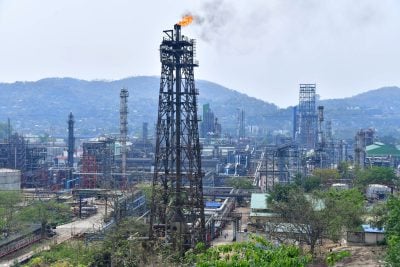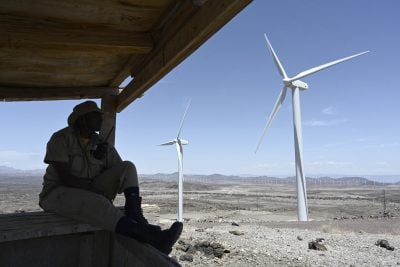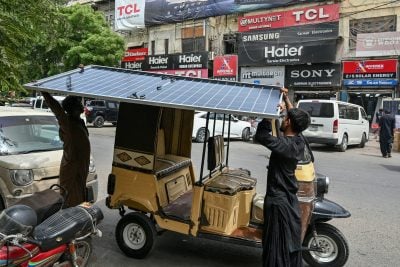Nigeria’s energy sector has been so apathetic that the word ‘power’ is regarded as a pathetic contradiction in terms. But it now seems that all this is to change dramatically and the word has reached foreign investors, who are visiting in greater numbers.
Last month, the US Assistant Secretary of State for African Affairs, Johnnie Carson, led an Energy Trade Mission to five African nations – including Nigeria – to explore the possibility of investing in these countries.
The delegation, which was made up of top government and private sector executives, held high-level discussions on opportunities and challenges for US private sector investment in energy infrastructure projects with senior government officials in the host countries.
Shortly before Carson’s five-nation tour, Nigeria’s President Goodluck Jonathan hosted a team of investors from GE, a US Fortune 500 Company, which also indicated interest in the country’s energy and rail sectors. GE’s global CEO, Jeffrey Immelt, who was head of the delegation, hinted that his company’s proposed investments in Nigeria would kick off shortly.
Beside these two recent visits, which reflect the growing level of confidence that foreign investors have in the ongoing reforms in Nigeria’s energy sector in particular, dozens of companies from other countries have declared their intention to invest in the power sector due to the huge opportunities that the privatisation of the nation’s electricity body, the Power Holding Company of Nigeria (PHCN), has thrown up for investors.
Nigeria, which has a population of 167m, has been grappling with a perennial shortage of power supply owing to the perceived inefficiency of PHCN, which is currently being unbundled to make it attractive for investors that had indicated interest in managing electricity for the country.
New electricity tariff
The government has taken another major step towards attracting the much-needed investment into the power sector by announcing a new electricity tariff regime which will take effect from April this year. The proposed tariff structure would increase the price of electricity in the country by as much as 88%. The government believes the tariff hike would serve as an incentive to investors and help to improve output, which is currently a little over 4,000 megawatts (MW). The tariff is expected to be announced before the privatisation of the 18 state-run power generation, distribution and transmission companies, this year.
The government had, in June last year, announced an upward review of the electricity tariff from N8.50 to N10.00 per kilowatt hour with a view to attracting investors. But it had to put off the implementation of the scheme owing to consumer complaints over dwindling power supply in the country, which hovered around 3,200MW then. The government has apparently taken advantage of the improved power supply to hike the tariff.
However, unlike the controversial removal of the fuel subsidy regime announced by the government on 1st January this year, which led to a virtual shutdown of the economy following a nationwide protest by organised labour unions and civil society groups in the country, the government has factored the poor into the proposed electricity tariff scheme this time around. Nigeria’s Minister of Power, Professor Bart Nnaji, explained that the government took the poor into consideration before coming up with the new tariff.
Nnaji added that under the proposed tariff structure, individuals and businesses who are the biggest consumers of electricity will pay the highest rates, while the poor will enjoy a subsidy to the tune of N60bn ($365m) this year.
He said: “We are making sure that the urban poor and rural dwellers are provided a cushioning so that they don’t see a significant increase in tariff. The rest should be able to pay for it.”
The government has also classified electricity consumers in the country into residential and commercial consumers, as part of efforts to cushion the effect of the hike on the ordinary Nigerian.
According to the government, residential consumers consist of three groups: R1 (low-income consumers resident in rural areas and in the cities); R2 (medium-income earners); and R3 (high-income earners). Under commercial consumers, there are three classes as well: C1 (micro and small -business enterprises); C2 (medium-scale enterprises) and C3 (large-scale industrial concerns).
Explaining further, the Chairman/Chief Executive of the Nigerian Electricity Regulatory Commission (NERC), Dr Sam Amadi, said that while R1 consumers in a major city like Abuja would pay N3.20 ($0.019) per kWh, R2 and R3 consumers in the same location would pay around N12 ($0.073) per kWh.
However, he added that the rate would vary from city to city, meaning that what an R1 consumer would pay in a city like Port Harcourt might be different from what his counterpart would pay in the nation’s commercial capital, Lagos.
Amadi said the differences in the price would reflect factors such as the capacity of the different power distribution companies, cost of service to customers, the number of customers in the location and cost of producing power.
Benefits of new tariffs
Experts have hailed the new tariff structure, pointing out that it will offer Nigerians a number of benefits. For instance, though the cost of power in Nigeria is reportedly one of the cheapest in the world, electricity supply and service in the country still rank among the worst. This has before now deterred foreign investors from investing in the sector. The ongoing reform in the power sector, including the proposed increase in tariff, is designed to remove these disincentives to investment. The government has also factored return on investment into the new tariffs to encourage investors and to reflect the real cost of supplying electricity in the country. Experts have added that the tariff, if fully implemented, would lead to the creation of more jobs in the country, as the new companies that would come on board would hire more staff. Individuals and companies in the country, who rely heavily on generating sets to augment the epileptic power supply from the national grid, may also have cause to smile as the tariff hike is expected to lead to considerable improvement in power supply in the country.
Currently, the cheapest generator set, popularly referred to as I-better-pass-my-neighbour, which is used by low-income families and micro-business owners, costs about N15,000 ($100). Less use of generator sets will also improve the overall quality of the environment, which has suffered massive pollution from fumes and oil waste. Besides, the high cost of goods and services in the country, often attributed to the poor power supply, may gradually reduce if the government musters the willpower to successfully implement the new tariff regime.
In addition, the spate of social unrest in some parts of the country, often attributed to idle hands, may be effectively curtailed if power supply improves because it will enable those that are out of work to engage in meaningful business ventures that require the use of electricity.
Foreign interest
A number of foreign investors, who have apparently seen the bright prospects, have declared their interest in the nation’s power sector. For instance, the Bureau of Public Enterprises (BPE), the government parastatal responsible for driving the privatisation programme of the Federal Government, had early last month invited two companies – Manitoba Hydro of Canada, and Power Grid of India – to submit bids for the management of the Transmission Company of Nigeria (TCN), one of the 18 companies carved out of the PHCN following its unbundling. Dozens of other foreign-owned companies have equally indicated their intention to have a piece of the pie.
Complex process
Experts have said the ongoing reform in the nation’s power supply is one of the most complex in the world due to the inherent technical challenges. Corruption and lack of political will on the part of the government have been cited as obstacles to the successful privatisation of the power sector.
Power Minister Nnaji, who seems to have a firm grip of the issues involved, has so far resisted moves to thwart progress of the exercise. He stirred a silent revolution in the electricity sector when he announced the liquidation of PHCN earlier in the year, thus setting the stage for the next phase of the programme. This has effectively opened up opportunities for the 18 unbundled companies of PHCN to be sold to the successful bidders by the end of the first quarter of 2012, as projected by the government.
Nnaji has also taken steps to curtail inefficiency in the system by insisting on a staff audit, a move that did not go down well with the workers who had threatened to embark on a national strike. At the time of going to press, negotiations between the minister and the electricity workers’ union were aimed at ironing out ‘grey areas’ before the exercise moves to the next level.
Analysts have predicted that the Nigerian economy will witness dramatic growth if power supply in the country improves.
Want to continue reading? Subscribe today.
You've read all your free articles for this month! Subscribe now to enjoy full access to our content.
Digital Monthly
£8.00 / month
Receive full unlimited access to our articles, opinions, podcasts and more.
Digital Yearly
£70.00 / year
Our best value offer - save £26 and gain access to all of our digital content for an entire year!

 Sign in with Google
Sign in with Google 




